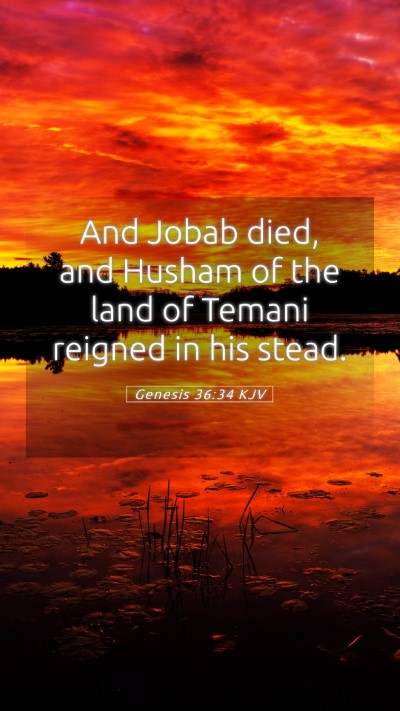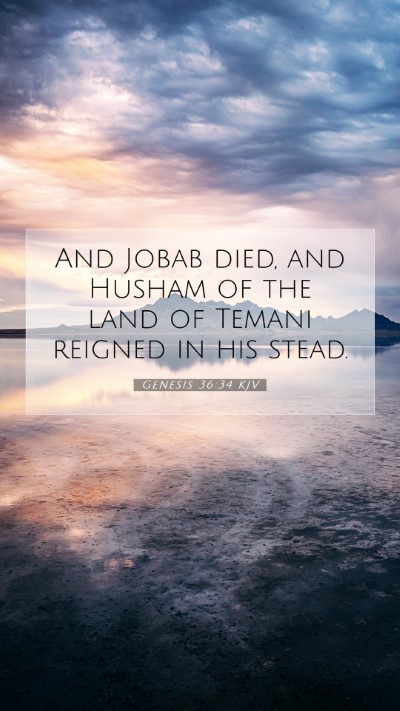Understanding Genesis 36:34: A Comprehensive Bible Verse Commentary
Genesis 36:34 states: "And Jobab died, and Husham of the land of the Temanites reigned in his stead." This verse is a part of the genealogical accounts in Genesis that outline the descendants of Esau, known as Edom, and it offers various insights into biblical history and relationships.
Overview of the Verse
This passage serves as a continuation of the lineage of Esau and presents a transition of power among the rulers descended from him. Understanding the implications of such a brief verse requires an examination of historical context and biblical interpretation.
Commentary Insights
Matthew Henry's Commentary
According to Matthew Henry, this verse reflects the cyclical nature of leadership in Esau's lineage, emphasizing the impermanence of earthly power. The succession from Jobab to Husham reveals the historical context of governance in Edom and underscores the importance of lineage and family in biblical narratives.
Albert Barnes' Commentary
Albert Barnes elaborates on the significance of the names mentioned, noting that Jobab and Husham may symbolize different regions and their contribution to the Isar's political landscape. This verse signifies a transition not only in leadership but also indicates the changing dynamics between neighboring nations.
Adam Clarke's Commentary
Adam Clarke offers a detailed perspective on the names and locations in this verse, indicating that Husham's reign could imply a period of strength for the Temanites. Clarke highlights how such rulers contributed to the socio-political environment of ancient Edom, providing modern readers with critical insights into the Biblical narrative's broader themes.
Thematic Significance
Genesis 36:34 exemplifies key themes such as:
- The Cycle of Life and Leadership: The death of one leader and the ascension of another represents the transient nature of human authority.
- Familial Relationships: The genealogy emphasizes how family lines dictated identity and community dynamics in ancient cultures.
- Historical Context: Understanding the rulers of Edom provides deeper insights into the historical backdrop of Israel and its neighbors.
Cross References
This verse connects with several significant passages that deepen our understanding:
- Genesis 36:1-3: An introduction to Esau's lineage and the significance of his descendants.
- Obadiah 1:10-14: Prophetic insights about Edom and its relationship with Israel.
- Numbers 20:14-21: Israel's interaction with Edom during their wilderness journey, showcasing historical events related to the descendants of Esau.
Applying the Verse to Life
When reflecting on Genesis 36:34, individuals can find applications in their own lives:
- Leadership Today: Understanding the impact of leadership transitions can provide insights into contemporary governance and community dynamics.
- Importance of Heritage: This verse encourages appreciation for one’s roots and the stories of those who came before.
- Legacy and Influence: Recognizing that our actions can influence future generations, akin to how Jobab and Husham shaped Edom's identity.
Conclusion
Genesis 36:34, while a brief passage in the Biblical text, opens the door to rich analysis and interpretation. By engaging with commentaries from scholars like Matthew Henry, Albert Barnes, and Adam Clarke, readers can better understand the intricacies of Scripture, the significance of historical context, and the implications for modern life.
This process enriches our Bible study insights and enables us to draw meaningful connections between the historical narratives and our spiritual journeys. Whether it be through participating in bible study groups or engaging in online Bible study, the quest to understand Scripture continues to be a vital part of the faith journey.


